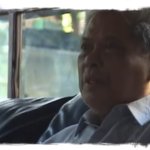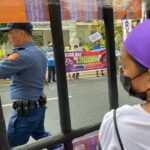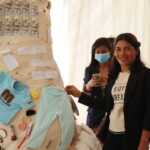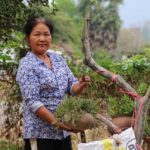I am to speak on alternatives to the APEC Agenda and in some measure much of what I have written and spoken about over the past years has addressed this topic. That is because the principles and values that are inherent in the APEC agenda are antithetical to the principles and values that I believe should govern a just society.
The APEC agenda is made explicit in various declarations. The objective is “free and open trade and investment for industrialised economies no later than 2010 and for developing economies no later than 2020.†It envisions an “open regional freed trade area as a means of promoting trade and investment liberalisation in the world as a whole.â€
What is less clear is why this end should be considered desirable. The argument for free trade is predicated on the theory of comparative advantage as enunciated by David Ricardo in the 19th century. According to theory, free trade encourages each country to pursue economic activities for which it is best adapted, thereby promoting global economic efficiency.
Even if we assume the validity of the theory and its good faith application it must be recognised that matters of fundamental significance are disregarded by the free trade economist. The effect of trade on the distribution of resources within the country is not a matter addressed by comparative advantage. Free trade advocates do not concern themselves with an analysis of which segments of the society prosper and which will find themselves further disadvantaged. The result has often been that even greater disparities of wealth are created by pursuing a course of international trade. Furthermore, the effects of trade on non-economic values is not addressed by the advocates of free trade. The extent to which the economic activity promotes satisfaction or despair is afforded no consideration.
As a Buddhist I cannot consider economic efficiency as the ultimate value for a social order. I am constrained to evaluate a system of social organisation in terms of its capacity to address human suffering, to promote distributive justice and allow for individuals within the society to realise their full potential.
I have seen the effects of the commitment to international trade in my country where rural farmers have been convinced to abandon their lives of simple self-sufficiency and to pursue the development of crops for export. They have often been unable to compete with larger and more efficient operations. Many have lost their land while the male members of the family have been forced to seek employment in construction or manufacturing in the city earning about five dollars a day. Many of daughters have been induced to venture into prostitution. The family unit and the community have been decimated in pursuit of international trade.
This unfortunate set of circumstances represents a success story, to the economist who measures social trends in terms in terms of enhancement of the gross national product. This social derangement and the concomitant destruction of the environment has been characterised as an aspect of the “East Asian Miracle†by the World Bank.
The APEC agenda is devised in furtherance of these trends. In this structure it is the transnational corporation which becomes the fundamental economic unit. It comes to replace the village or the community as matrix for human interaction. With the development of economic control comes a further transmigration of political power. The ethical values which are dependent upon an appreciation of oneself as a member of a community with a responsibility for the welfare of others in the community cannot be sustained when the institutions which govern our lives are centralised and remote and preclude meaningful participation in the decision making process.
Rather than the global economy projected for the second decade of the twenty-first century we should seek the reinstatement of the community as the most significant social, political and economic entity. With the globalisation of the economy in Asia has come the incursion of consumerism which is a by-products of western capitalism. Greed and waste have replaced compassion and sharing. Instead of focusing on creating an international economic and social order we should look to our culture and the traditions manifested in our public life as a source of value. We should be aiming for small-scale interdependent economies and decentralised institutions.
The centralisation of power that has developed has deprived the individual of any significant control of his destiny. And while it may be true that power corrupts, so does powerlessness. It is only through the establishment of a public sphere where one becomes engaged in the process of making decisions which will affect oneself and other members of the community that people come to recognise their social responsibilities and the nature of human interdependence. The individual is not afforded any such role in the international economic order which emerges from the APEC agenda.
So what can we propose as an alternative agenda for APEC if liberalisation of trade is not to be the ultimate value? The increased dependency of the Asian economies on international trade has created certain dilemmas which can best be confronted through an international strategy. Presently, the transnational corporation is capable of favouring the country that allows for the greatest exploitation of its workers and the most unrestrained degradation of the environment. Suppression of wages and workers rights has become an aspect of national economic policy for countries which perceive their comparative advantage to be the availability of cheap labour. The protection of workers rights on a national level may prove to be self defeating if it merely serves to cause the Employer to relocate to a less conscientious country. International standards can be established and enforced to prevent the corporations from forcing Asian countries to compete by offering the worst working conditions.
Similarly, environmental protection is a matter that can best be regulated by an international organisation such as APEC. The unilateral imposition of regulatory measures designed to protect the environment will probably result in business migrating to less restrictive places. An enforceable APEC agenda to restrict enterprises which destroy the environment would prevent a country from having to sacrifice the environment in order to prevent businesses from seeking a less responsible neighbour.
Given the current dependence of the Asian economies on international trade a transition to alternative economic structures must be carefully pursued. Surely an economic system that truly promote human values, that seeks to limit suffering and is committed to true democratic principles will require more thought than a blind commitment to neoliberal policies: but let that be our aspiration for the next century –- one that we will pursue mindfully and with skilful means.
* Sulak Sivaraksa is Thailand’s leading social critic and the 1995 recipient of the prestigious Right Livelihood Award, also known as the Alternative Nobel Prize. He is credited with starting the indigenous NGO movement in Thailand through his creation of a string of social welfare and development organisations rooted in different aspects of Thai society. Running through all the organisations inspired by Sulak are two principal themes: a rejection of western consumerist models, and an emphasis on the importance of spiritual and religious dimension of human life, rooted in his deep Buddhist sensibility. Sulak’s social activism has repeatedly brought him repression from Thailand’s authorities. He was twice, in 1984 and in 1991, charged in court of lese majeste or slandering the King. In the first instance, the King of Thailand intervened to have the case withdrawn and in the second, he was finally acquitted in 1995.






